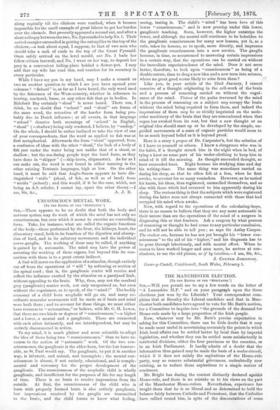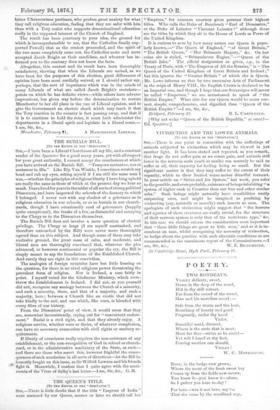THE MANCHESTER ELECTION.
[TO THE EDITOR OE THE "SPECTATOR"] SH2,—Will you permit me to say a few words on the letter of "A Lancashire M.P. " and on yoar paragraph upon the three elections just won by the Liberals? Your correspondent com- plains that at Burnley the Liberal candidate and that in Man- chester both candidates have agreed to vote for Mr. Butt's motion, for a Committee to inquire into "the grounds of the demand for Home-rule made by a large proportion of the Irish people.
Now, whatever may be Mr. Butt's precise expectation in asking for this Committee, there can be little doubt that it may be made most useful in ascertaining accurately the points in which Irish local affairs can be settled better by local than by imperial legislation, and whether they can be settled more satisfactorily in territorial divisions, either the four provinces or the counties, or in an Irish Parliament. It hardly admits of a doubt that the information thus gained may be made the basis of a modus vivendi, which if it does not satisfy the aspirations of the Home-rule party, may so remove substantial grievances, undoubtedly now existing, as to reduce those aspirations to a simple matter of sentiment.
Mr. Bright has during the contest distinctly declared agaiffit Home-rule, and there is no mistake as to his views on the part of the Manchester Home-rulers. Nevertheless, experience has taught them that he is so liberal and so determined to hold the balance fairly between Catholic and Protestant, that the Catholics have rallied round him, in spite of the denunciations of some bitter Ultramontane partisans, who profess great anxiety for what they call religious education, feeling that they are safer with him than with a Tory zealot who supports denominational education really in the supposed interest of the Church of England.
The result has been (contrary to your idea, the ground for which is incomprehensible to me, that the Catholics finally sup- ported Powell) that as the contest proceeded, and the spirit of the two more completely came out, the Catholics more and more accepted Jacob Bright as their candidate, and whoever has in- formed you to the contrary does not know the facts.
Altogether, this contest and its result have been thoroughly satisfactory, showing that when the Liberals are united, as we have been for the purposes of this election, great differences of opinion have been most cordially waived, or I should rather say, perhaps, that the sort of impatience which was in the minds of many Liberals of what are called Jacob Bright's crotchets— points on which he has definite views—while others have adverse impressions, has given way before the determination to restore Manchester to her old place in the van of Liberal opinion, and to give the Government an electric shock which may teach it that the Tory reaction in the country is fast passing away, and that if it is to continue to hold the reins, it must both administer the departments in a liberal spirit and legislate in a liberal sense.— I am, Sir, &c.,



































 Previous page
Previous page